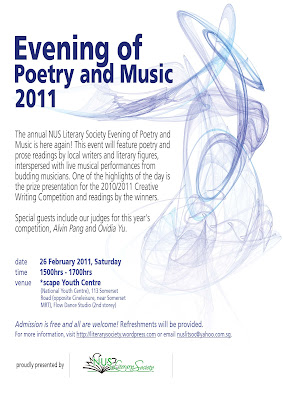The February 2011 issue of Cha has now been launched. We would like to thank Arthur Leung (poetry) and Reid Mitchell (prose) for returning to the post of guest editors and reading the submissions with us. We would also like to thank our Reviews Editor, Eddie Tay, for curating an expanded section of reviews. The issue also features a new editorial by Jeff Zroback entitled "When You Live with a Poet".
The following writers/artists have generously allowed us to showcase their work:
POETRY: Krishnakumar Sankaran, Vineet Kaul, David Sutherland, Graeme Brasher, Randy Gonzales, Mary-Jane Newton, Divya Rajan, Nicholas Y.B. Wong, Jason Eng Hun Lee, Shelton Pinheiro, Jeffrey Thomas Leong, Changming Yuan
FICTION: Shivani Sivagurunathan, Vandana Nambiar, Vineetha Mokkil, Margaret Hui Lian Lim, Ram Govardhan
LOST TEA: Bob Bradshaw
PHOTOGRAPHY & ART: Annysa Ng (cover artist), Christopher Szabla, Yip Wai Shai, Steve Wing
INTERVIEW: Elaine Woo
REVIEWS: Reid Mitchell, Jason Eng Hun Lee, Alice Tsay, Michael O'Sullivan, William Noseworthy, Abigail Licad, Mary-Jane Newton, Vivian Ding and Michael Tsang who review the following books:
Kristine Ong Muslim's A Roomful of Machines, Mani Rao's Ghostmasters, Sherry Quan Lee's Chinese Blackbird, Melody S. Gee's Each Crumbling House, Robert Raymer's Tropical Affairs, Shimao Shinzo and Madeleine Marie Slavick's Something Beautiful Might Happen, Dimitris Lyacos's Poena Damni, Z213: Exit, Tiziano Fratus's Creaturing, Jack Kornfield's The Buddha is Still Teaching, Khế Iêm's (ed.) Poetry Narrates: An Anthology of Vietnamese New Formalism Poetry, O Thiam Chin's Under the Sun, Karen Llagas's Archipelago Dust, Sweta Srivastava Vikram's Because All is Not Lost, Anindita Sengupta's City of Water, Edwin Thumboo's (ed.) Fifty on 50, Xu Xi's Habit of a Foreign Sky, and Rahna Reiko Rizzuto's Hiroshima in the Morning.
Our fourteenth issue ("The China Issue") is due out in June 2011. Cha former contributor, distinguished Chinese scholar and poet Yibing Huang will be joining us as guest editor. We are also accepting submissions for the Fourth Anniversary Issue, which is scheduled for November 2011. Robert E. Wood (poetry) and Royston Tester (prose) will act as guest editors. If you are interested in having your work considered for publication in Cha, please read our submission guidelines.
We would also like to draw our readers' attention to the Hong Kong International Literary Festival 2011. The festival will take place between 8-18 March and it features a great line-up of writers, including Cha contributors Martin Alexander, Andy Barker, Viki Holmes, Wena Poon, Xu Xi, Louise Ho, Leung Ping-Kwan and our Reviews Editor Eddie Tay. More information about the festival: http://www.festival.org.hk/
Finally, if you liked a story published in Cha in 2010, please consider nominating it for the storySouth's Millions Writers Award: http://asiancha.blogspot.com/2011/02/2011-millions-writers-award.html
We hope you will enjoy the new issue of Cha. Thank you for your continued support.
t@asiancha.com | j@asiancha.com
-
Leave a comment & let us know your thoughts on the issue.






























































